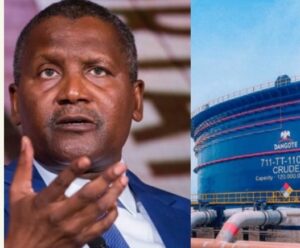Dangote: Why We Had to Import 150,000 Containers Through Lome Port for Refinery
Dangote: Why We Had to Import 150,000 Containers Through Lome Port for Refinery

Aliko Dangote, President of the Dangote Group, has shared new insights into the sheer scale and difficulty of building the continent’s largest oil refinery, revealing that the project required the importation of 150,000 containers—most of which passed through Lome Port in Togo due to Nigeria’s limited port capacity.
Speaking at the Global Commodity Insights Conference on West Africa’s refined fuel market in Abuja, Dangote explained that the Dangote Refinery, which has a processing capacity of 650,000 barrels per day, faced serious logistical and infrastructure hurdles from the outset.
He noted that Nigeria’s ports were simply not equipped to handle more than 60% of the heavy equipment and machinery needed for the refinery, prompting the company to develop its own seaport.
“We didn’t just construct a refinery—we had to build a port too,” Dangote said. “Imagine importing 150,000 containers, many of which had to be routed through Lome and transported into Nigeria.”
Beyond logistics, Dangote described the technical challenges of the site itself. The refinery spans over 2,700 hectares, with about 70% of the land originally being swampy terrain. This required extensive sand-filling and land preparation to create a stable foundation.
Construction efforts involved the installation of millions of meters of pipes and cables, and the project had to accommodate massive machinery, including components weighing up to 3,000 tons. COVID-19 disruptions and equipment issues added to the complexity.
At the height of the project, more than 67,000 workers—representing hundreds of different nationalities—were employed to bring the refinery to life.
However, logistical difficulties weren’t the only barriers. Dangote also highlighted the challenges of sourcing crude oil domestically. Despite Nigeria’s oil reserves, local suppliers prioritized export markets, forcing the refinery to import crude from countries such as the U.S., Brazil, Angola, and Algeria. These international purchases came with added financial pressure, especially with the volatility of exchange rates.
He also took aim at Nigeria’s high port and regulatory fees, which he said are considerably higher than those in nearby countries. These increased costs, coupled with inconsistent fuel standards across African nations, continue to hamper trade in refined petroleum products within the region.
According to Dangote, the lack of uniform regulations and the influx of cheap and sometimes substandard imported fuels pose a serious threat to local refineries’ survival.
He called on African governments to step in and support industrialization efforts by harmonizing fuel standards, reducing unfair competition, and promoting domestic refining.
Despite all the hurdles, Dangote expressed optimism. The refinery has already started exporting to several West African nations and plans to broaden its supply chain and distribution networks.
He concluded with a strong message: “Without the right political backing, we won’t see another large refinery built in Africa anytime soon.”
Dangote’s experience, he noted, reflects the broader challenges facing Africa’s industrial growth—but also the incredible potential that lies ahead if
the right steps are taken.
TRENDING SONGS
 NPMA Appeals to Nigerian Government for Compensation After Lagos Market Fire
NPMA Appeals to Nigerian Government for Compensation After Lagos Market Fire
 Rest Every Four Hours, FRSC Issues Safety Guide for Fasting Motorists
Rest Every Four Hours, FRSC Issues Safety Guide for Fasting Motorists
 NNPC Boss Ojulari Bags UK Energy Institute Fellowship
NNPC Boss Ojulari Bags UK Energy Institute Fellowship
 Shock in Anambra: Bride Disappears Moments Before Wedding
Shock in Anambra: Bride Disappears Moments Before Wedding
 Nigerian Woman Returns ₦330 Million Accidentally Credited to Her Account
Nigerian Woman Returns ₦330 Million Accidentally Credited to Her Account
 APC Don Reach Morocco?’ VeryDarkMan Reacts to Seyi Tinubu Poster
APC Don Reach Morocco?’ VeryDarkMan Reacts to Seyi Tinubu Poster
 Bride Breaks Down in Tears as Wedding Meals Were Kept Secretly While Guests Go Home Hungry
Bride Breaks Down in Tears as Wedding Meals Were Kept Secretly While Guests Go Home Hungry
 Odogwu by Day, Robber by Night: How Marriage Joy Turned Into Tragedy
Odogwu by Day, Robber by Night: How Marriage Joy Turned Into Tragedy
 Nigerian Officials Allegedly Pocket N4–6B Weekly Through Smuggling Cartels at Seme–Badagry Border
Nigerian Officials Allegedly Pocket N4–6B Weekly Through Smuggling Cartels at Seme–Badagry Border
 Ahmad Yerima: Naval Officer to Face No Sanctions After Clash with Wike – Matawalle
Ahmad Yerima: Naval Officer to Face No Sanctions After Clash with Wike – Matawalle
Share this post with your friends on ![]()













